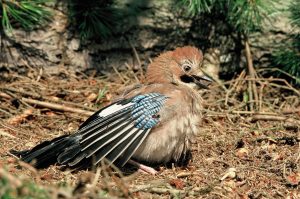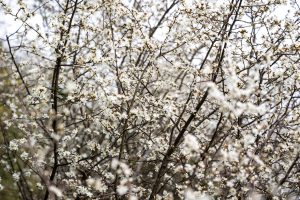Vine House Farm's take on this year's RSPB Big Garden Bird Watch results
The results of the RSPB's Big Garden Birdwatch 2019 didn’t bring too many surprises, with numbers of small birds affected by the unusually cold weather in early spring last year (the so called beast from the east). So with populations hit by the snow and low temperatures, fewer birds survived to breed and therefore there were less in our gardens this spring. On a broader scale and although there are a few individual good news stories, the overall picture for songbirds continues to be a poor one.
House sparrow numbers continue to show a slight recovery
On a fairly positive note, it was certainly good news that the very slight recovery in house sparrow numbers seems to be continuing, with a 10% rise in numbers over the last 10 years. However and for context, since the RSPB started their annual Big Garden Birdwatch 40 years ago, house sparrow numbers have declined by 56%. That said, in real terms house sparrows are still very numerous – and hence why, for the 16th year on the trot, they’ve been the number one bird recorded in the UK’s gardens.
Starling and song thrush numbers continue to decline
Although coming in at number two in the survey, the starling continues to decline in numbers. Indeed, over the last 40 years the species has reduced by a staggering 77%. As it happens and also very sadly, the percentage decline in numbers for the song thrush is also the same.
Better news for coal tits and goldfinches
Putting aside the blip in songbird numbers caused by last year’s unusually harsh spring weather, coal tit numbers are up by 245% since 1979, and goldfinch numbers have increased by 70% since the early 2000s – and there’s no question that this increase for the latter has been very much influenced by garden feeding with foods such as niger seed and sunflower hearts.
Our view on the findings of the Big Garden Birdwatch
At Vine House Farm Bird Foods, we are of course actively and directly involved in measures to reverse the decline in songbird numbers, and this through the far-reaching conservation and other management work on our farm, plus our partnership with The Wildlife Trusts. We also seek to positively influence other farmers to manage their land with wild birds and other wildlife firmly in mind.
We think there is certainly some good news in this year’s survey from the RSPB – and applaud the charity for the way they continue to involve and inspire the general public to get involved with it. However, the overall trend for songbird numbers is clearly not good, with the reasons for the declines now largely understood – which include loss of breeding habitat, and less invertebrates because of industrial farming methods and the effects of global warming. So whilst we can all do our bit by, for example, putting up nest boxes and feeding birds all year round – be it in our individual gardens or on a larger scale such as here on our farm – the fact is that it requires political will to change the destructive way us humans live. And by political will, we mean on a global scale – not just on our own relatively tiny island. And it’s that political will that we’ll continue to use our influence on, albeit small within the scheme of things, to try and change it for the better.
House sparrow numbers continue to show a slight recovery
On a fairly positive note, it was certainly good news that the very slight recovery in house sparrow numbers seems to be continuing, with a 10% rise in numbers over the last 10 years. However and for context, since the RSPB started their annual Big Garden Birdwatch 40 years ago, house sparrow numbers have declined by 56%. That said, in real terms house sparrows are still very numerous – and hence why, for the 16th year on the trot, they’ve been the number one bird recorded in the UK’s gardens.
Starling and song thrush numbers continue to decline
Although coming in at number two in the survey, the starling continues to decline in numbers. Indeed, over the last 40 years the species has reduced by a staggering 77%. As it happens and also very sadly, the percentage decline in numbers for the song thrush is also the same.
Better news for coal tits and goldfinches
Putting aside the blip in songbird numbers caused by last year’s unusually harsh spring weather, coal tit numbers are up by 245% since 1979, and goldfinch numbers have increased by 70% since the early 2000s – and there’s no question that this increase for the latter has been very much influenced by garden feeding with foods such as niger seed and sunflower hearts.
Our view on the findings of the Big Garden Birdwatch
At Vine House Farm Bird Foods, we are of course actively and directly involved in measures to reverse the decline in songbird numbers, and this through the far-reaching conservation and other management work on our farm, plus our partnership with The Wildlife Trusts. We also seek to positively influence other farmers to manage their land with wild birds and other wildlife firmly in mind.
We think there is certainly some good news in this year’s survey from the RSPB – and applaud the charity for the way they continue to involve and inspire the general public to get involved with it. However, the overall trend for songbird numbers is clearly not good, with the reasons for the declines now largely understood – which include loss of breeding habitat, and less invertebrates because of industrial farming methods and the effects of global warming. So whilst we can all do our bit by, for example, putting up nest boxes and feeding birds all year round – be it in our individual gardens or on a larger scale such as here on our farm – the fact is that it requires political will to change the destructive way us humans live. And by political will, we mean on a global scale – not just on our own relatively tiny island. And it’s that political will that we’ll continue to use our influence on, albeit small within the scheme of things, to try and change it for the better.


